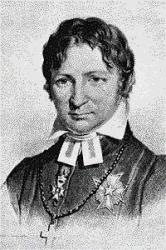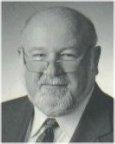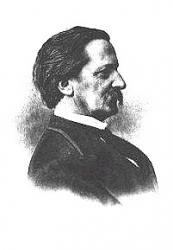Planning worship?
Check out our sister site, ZeteoSearch.org,
for 20+ additional resources related to your search.
- |
User Links
Person Results
Frans Michael Franzén

1772 - 1847 Person Name: Frans Mikael Franzen Topics: liturgical Scripture Songs Author of "Isaiah 40 (Prepare the Way)" in Voices United Franzén, Franz Michael, was born at Uleabôrg, Finland, in 1772, and educated at the University of Abo, where he became Librarian and Professor of Literary History. He was subsequently Minister at Kumla, Orebro, Sweden, and then of Santa Clara, in Stockholm. He was consecrated Bishop of Hernosand, in 1841, and died there in 1847. (See Supplement to Longfellow's Poets and Poetry of Europe.) Of his pieces one is in English common use. It begins "Jesum haf i ständigt minne," translated by Mrs. Charles in her Christian Life in Song, 1858, p. 250, as "Jesus in Thy memory keep" (Looking unto Jesus). Usually it begins with stanza ii., "Look to Jesus, till, reviving."
--John Julian, Dictionary of Hymnology, Appendix, Part II (1907)
Frans Michael Franzén
P. P. Bliss

1838 - 1876 Person Name: Philip P. Bliss, 1838-1876 Topics: Book Four: Occasional Selections, Gospel Songs and Hymns; Holy Scriptures Author of "Sing Them Over Again to Me" in The Christian Hymnary. Bks. 1-4 Philip P. Bliss (b. Clearfield County, PA, 1838; d. Ashtabula, OH, 1876) left home as a young boy to make a living by working on farms and in lumber camps, all while trying to continue his schooling. He was converted at a revival meeting at age twelve. Bliss became an itinerant music teacher, making house calls on horseback during the winter, and during the summer attending the Normal Academy of Music in Genesco, New York. His first song was published in 1864, and in 1868 Dwight L. Moody advised him to become a singing evangelist. For the last two years of his life Bliss traveled with Major D. W. Whittle and led the music at revival meetings in the Midwest and Southern United States. Bliss and Ira D. Sankey published a popular series of hymn collections entitled Gospel Hymns. The first book of the series, Gospel Songs, was published in 1874. Bliss's tragic death at the age of thirty-eight happened near the end of 1876. Philip P. Bliss and his wife were traveling to Chicago to sing for the evangelistic services led by Daniel W. Whittle at Dwight L. Moody's Tabernacle. But a train wreck and fire en route claimed their lives.
Bert Polman
=================
Bliss, Philip, b. at Clearfield County, Pennsylvania, July 9, 1838. In 1864 he went to Chicago in the employ of Dr. George F. Root, the musician, where he was engaged in conducting musical Institutes, and in composing Sunday School melodies. Originally a Methodist, he became, about 1871, a choirman of the First Congregational Church, Chicago, and the Superintendent of its Sunday Schools. In 1874 he joined D. W. Whittle in evangelical work. To this cause he gave (although a poor man) the royalty of his Gospel Songs, which was worth some thirty thousand dollars. His death was sudden. It occurred in the railway disaster at Ashtabula, Ohio, Dec. 30, 1876. ... Some of his verses have obtained wide popularity in most English-speaking countries. The more widely known, and specially those which are found in collections in use in G. Britain, are in the following American works:—
i. The Prize, 1870.
1. I should like to die. Death anticipated. This is one of his earliest compositions, and is unworthy of the position it holds.
2. Through the valley of the shadow I must go. Death anticipated.
3. Whosoever heareth, shout, shout the sound. Jesus the Way. Written during the winter of 1869-70 after hearing Mr. H. Moorhouse (from England) preach on St. John iii. 16.
ii. The Charm, 1871.
4. Almost persuaded now to believe. Procrastination. This was suggested by the following passage in a sermon by the Rev. Mr. Brundnge, Bliss being present at its delivery:—" He who is almost persuaded is almost saved, but to be almost saved is to be entirely lost."
5. Ho! my comrades! see the signal. Faithfulness.
6. O! Jerusalem, the golden city, bright, &c. Heaven.
7. On what Foundation do [did] you build? Christ the Foundation.
iii. The Song Tree, 1872.
8. Light in the darkness, sailor, day is at hand. Safety. This hymn, “The Life-Boat," has attained to great popularity. The incident upon which it is based, that of the rescue of a ship's crew by a life-boat, is given in detail by Mr. Sankey in his Sacred Songs, &c, No. 99 (large ed.). It is sometimes known by its refrain, "Pull for the shore," &c.
iv. The Joy, 1873.
9. In me ye may have peace. Peace.
10. To die is gain. Death anticipated.
v. Sunshine, 1873.
11. Down life's dark vale we wander. Death anticipated.
12. More holiness give me. For Holiness.
13. Only an armour-bearer. Soldiers of the Cross.
14. Standing by a purpose true. Faithfulness.
15. This loving Saviour stands patiently. Invitation.
vi. Gospel Songs, 1874.
16. A long time I wandered. Peace and Joy.
17. Brightly beams our Father's mercy. Mercy.
18. Come, brethren, as we march along. Praise.
19. Free from the law, O happy condition. Redemption.
20. Have you on the Lord believed? Fullness of Grace. This hymn arose out of the following circumstances :—" A vast fortune was left in the hands of a minister for one of his poor parishioners. Fearing that it might be sqmandered if suddenly bestowed upon him, the wise minister sent him a little at a time, with a note saying, “This is thine; use it wisely; there is more to follow.” Hence also the refrain ‘More to follow,’ by which the hymn is known."
21. How much owest thou? Divine Claims.
22. I know not the hour when my Lord will come. Death anticipated. Suggested by reading the book, The Gates Ajar.
23. See the gentle Shepherd standing. The Good Shepherd.
24. Though the way be sometimes dreary. Divine Leading.
25. Will you meet me at the fountain? Fountain of Living Water. The incident out of which this hymn arose is thus stated in The Christian, No. 365, "At the Industrial Exposition at Chicago it was an everyday appointment to meet at the Central Fountain. Mr. P. P. Bliss, whose mind seemed always set on things above, caught up the words, and wrote this hymn, 'Meet me at the Fountain.'"
vii. Gospel Hymns, No. 1, 1875.
26. One offer of salvation. The Name of Jesus.
27. Wandering afar from the dwellings of men. The Lepers.
viii. The International Lesson Monthly, 1875.
28. Weary gleaner, whence comest thou? Duty.
29. The whole world was lost in the darkness of Sin. Light of the world.
30. Man of sorrows! what a name. Redemption.
31. The Spirit, O sinner, in mercy doth move. Holy Spirit.
ix. Gospel Hymns, No. 2, 1876.
32. At the feet of Jesus. The good choice.
33. Come, sing the Gospel's joyful sound. Salvation.
34. Cut it down, cut it down. Justice and Mercy.
35. Do you see the Hebrew captive? Prayer.
36. Hallelujah, He is risen. Easier. Written in the spring of 1876 and first sung by Bliss on Easter afternoon, 1876, in the Court House Square, Augusta, Georgia, to 5900 people.
37. In Zion's rock abiding. Safety.
38. Repeat the story o'er and o'er. Grace and Peace.
39. Tenderly the Shepherd. The Good Shepherd.
x. Gospel Hymns, No. 3, 1878.
40. Hear ye the glad good news from heaven. Faith and Salvation.
41. I will sing of my Redeemer. Praise.
xi. Gospel Hymns, No. 4, 1881.
42. 'Tis known on earth and heaven too. More about Jesus.
xii. Various.
43. Sing over again to me. Words of Life. This appeared in a paper entitled Words of Life, 1874, The following are undated:—
44. March to the battle-field. Duty and Victory.
45. There is sin in the camp. Hinderances.
46. 'Tis the promise of God. Praise.
47. While the silvery moon-beams, fall, New Birth.
48. God is always near me. Omnipresence.
Two hymns," I am so glad that our Father in heaven," and " Sowing the seed by the daylight [dawnlight] fair," (sometimes given as " Sowing our seed in the morning fair ") are usually attributed to Mr. Bliss. In his Gospel Songs, Cincinnati, 1874, however, he lays claim to the music only. Mr. Sankey attributes this last to "E. A. Oakey." With the exception of No. 48, these hymns are given in Mr. Sankey's Sacred Songs & Solos, Pts. i. and ii. Their popularity is far beyond their literary merits, and is mainly due to the simple melodies to which they are wedded. As a writer of hymns of this class Mr. Bliss is second only to Mrs. Van Alstyne. Many anecdotes concerning hymns of this class are given in American Evangelists; an Account of their work in England and America, by the Rev. Elias Nason, Boston, U.S., Lathrop & Co., 1877.
Mr. Bliss is usually known as "P. P. Bliss." This is found on the title-pages of his collections. On his own authority, however, we are enabled to say that his name originally stood thus : “Philipp Bliss.” Early in life he separated the final p from his Christian name, constituted it a capital P, and thus produced "P. P. Bliss." (For this article we are mainly indebted to Professor F. M. Bird, and Mr. H. P. Main.)
-John Julian, Dictionary of Hymnology (1907)
========================
Bliss, Philip , p. 151, i. "Sowing the seed by the daylight fair" is in the Family Treasury , Edinburgh, 1861, pt. i., p. 84. It is said to be by Miss Emily Sullivan Oakey; born at Albany, N. York, Oct. 8, 1829, died May 11, 1883. Note also that Bliss's hymn, No. 43. on p. 150, ii., should read, "Sing them over again to me."
--John Julian, Dictionary of Hymnology, Appendix, Part II (1907)
=====================
Bliss, P., p. 150, i. Two works have been brought to our notice, since the issue of our first edition of this Dictionary, which concern this author, viz.:—
1. Memoirs of Philip P. Bliss. Edited by D. W. Whittle. Contributions by Rev. E. P. Goodwin, Ira D. Sankey, and Geo. F. Root. Introduction by D. L. Moody. New York, &c.: A. S. Barnes & Co., 1877.
2. My Life and Sacred Songs. By Ira D. Sankey. With an Introduction by Theodore L. Cuyler, D.D). London: Hodder & Stoughton, and Morgan & Scott, 1906.
These works have a special interest for those who use I. D. Sankey's Sacred Songs & Solos, and all of P. Bliss's publications. To Mr. Sankey's My Life, &c, we direct special attention for P. Bliss's hymns:—
“Do you see the Hebrew captive kneeling?" p. 294.
"Down life's dark vale we wander." p. 285.
"Ho! my comrades, see the signal." p. 105.
"'Tis the promise of God full salvation to give." p. 99.
--John Julian, Dictionary of Hymnology, New Supplement (1907)
P. P. Bliss
John W. Arthur
1922 - 1980 Topics: liturgical Scripture Songs Adapter of "Revelation 5:12-13 (This Is the Feast of Victory)" in Voices United
John W. Arthur
Peter Scholtes

1938 - 2009 Topics: Scripture Songs Author of "They'll Know We Are Christians by Our Love" in Sing Joyfully Peter Scholtes (1938–2009)
Peter was born in Evanston, Illinois and grew up in Oak Park, where he attended Ascension School and Fenwick High School before studying at Quigley and St. Mary of the Lake-Mundelein seminaries. He earned his Masters in Adult Education and Organization Development at Boston University.
Peter wrote the hymn "They'll Know We Are Christians by Our Love" while he was a parish priest at St. Brendan's on the South Side of Chicago in the 1960s. At the time, he was leading a youth choir out of the church basement and was looking for an appropriate song for a series of ecumenical, interracial events. When he couldn't find such a song, he wrote the now-famous hymn in a single day. His experiences at St. Brendan's, and in the Chicago Civil Rights movement, influenced him for the rest of his life.
After working in the public sector in Lynn, Massachusetts and Madison, Wisconsin, Peter became a consultant with Joiner Associates in the 1980s, traveling the globe to help businesses engage employees' talents more fully, humanely, and effectively. He co-authored The Team Handbook, which was named one of The 100 Best Business Books of All Time (in the book of that title). After starting Scholtes Seminars and Consulting, he wrote the classic The Leader's Handbook in 1998, which made the definitive case against performance appraisal—a practice he argued was demoralizing and wrong.
--www.lorenz.com/composers
Peter Scholtes
James Quinn
1919 - 2010 Person Name: James Quinn, S.J. (1919- ) Topics: Scriptural Songs Author (sts. 1 and 2) of "To God with gladness sing" in The Summit Choirbook James Quinn (b. Glasgow, Scotland, April 21, 1919; d. Edinburgh, Scotland, April 8, 2010) was a Roman Catholic Jesuit priest who was ordained in 1950. As a consultant for the International Commission on English in the Liturgy, sparked by Vatican II, he has exerted influence far beyond his native Scotland. A collection of his hymn texts is available from Selah Publishing company.
Sing a New Creation
James Quinn
Anonymous
Topics: Scriptural Songs Author (st. 3) of "To God with gladness sing" in The Summit Choirbook In some hymnals, the editors noted that a hymn's author is unknown to them, and so this artificial "person" entry is used to reflect that fact. Obviously, the hymns attributed to "Author Unknown" "Unknown" or "Anonymous" could have been written by many people over a span of many centuries.
Anonymous
Johann Rudolf Ahle
1625 - 1673 Person Name: Johann Rudolph Ahle Topics: The Church at Worship Scripture; liturgical Songs of Illumination; Baptism; Bible; Church Education; God House, Home; Holy Spirit Illumination; Jesus Christ Lord of Life; Jesus Christ Prophet; Jesus Christ Teacher/Teachings; Light; Opening Hymns; Praise; Service Music Gathering, Call to Worship, Greeting; Service Music Prayer for Illumination; Service Music Litany Prayer; Word of God; Epiphany 3 Year A; Proper 9 Year A; Epiphany 2 Year B; Lent 4 Year B; Proper 21 Year B; Epiphany 2 Year C; Easter 3 Year C Composer (melody) of "LIEBSTER JESU" in Voices United Johann Rudolph Ahle, b. Mühlhausen, 1625; Ahle studied theology at Erfurt University. Little is known about his musical education, but be became well known as an organist while he was in Erfurt. He returned to Mühlhausen and became an organist at St. Blasius Church, he composed organ music but is know for his sacred choral music. He was the father of Johann Georg, who was also a composer and succeeded his father as organist at St. Blasius Church. Johann Rudolf became mayor of Mühlhausen late in his life and died there in 1673.
Dianne Shapiro (from Bach Cantatas Website www.bach-cantatas.com/Lib/Ahle-Johann-Rudolf.htm)
Johann Rudolf Ahle
Charles P. Price
1920 - 1999 Topics: liturgical Scripture Songs Adapter of "Isaiah 40 (Prepare the Way)" in Voices United Price was born in Pittsburgh in 1920 and educated at Harvard University, Virgina Theological Seminary, and Union Theological Seminary in New York City. He studied piano with Elizabeth and Ferguson Webster and was ordained as a deacon and priest in the Episcopal Church, Diocese of Pittsburgh. He served churches in Pennsylvania and New York City before becoming a professor at Virginia Theological Seminary (1956-1963). From 1963 to 1972 he was preacher to the university and Plummer Professor of Christian Morals at Harvard University before returning to Virginia Seminary as professor of systematic theology (1972-1989).
Price was a member of the Standing Liturgical Commission (1967-1985) and the Committee on Texts for The Hymnal 1982 (1976-1982), as well as deputy to the General Convention (1976-1985) and chaplain to the House of Deputies (1979-1985) for the Episcopal Church. His books include Introducing the Proposed Book of Common Prayer (1976) and, with Louis Weil, Liturgy for Living (1979). A number of his hymns and translations appear in The Hymnal 1982.
--The Presbyterian Hymnal Companion
Charles P. Price
Charles H. Purday
1799 - 1885 Topics: Scripture Songs; Scripture Songs Composer of "[Unto the hills around do I lift up]" in Hymns of Faith Charles H. Purday (1799-1885) A publisher, composer, lecturer, and writer, Purday had a special interest in church music. He published Crown Court Psalmody (1854), Church and Home Metrical Psalter and Hymnal (1860), which included SANDON, and, with Frances Havergal, Songs of Peace and Joy (1879). A precentor in the Scottish Church in Crown Court, London, Purday sang at the coronation of Queen Victoria. In the publishing field he is known as a strong proponent of better copyright laws to protect the works of authors and publishers.
Bert Polman
Charles H. Purday
Josiah G. Holland

1819 - 1881 Topics: liturgical Scripture Songs Author of "There's a Song in the Air" Holland, Josiah Gilbert, was born at Belchertown, Massachusetts, July 24, 1819. He was for some time on the staff of the Springfield Republican, and became in 1870 the editor of Scribner's Magazine. He has written several successful books, and some poetical pieces. One of the latter, "For summer's bloom, and autumn's blight" (Praise in and through all things), was included, from Bitter Sweet, 1858, in the Boston Unitarian Hymn [and Tune] Book for the Church & Home, 1868. He died Oct. 12, 1881.
--John Julian, Dictionary of Hymnology (1907)
===============
Holland, J. G. , p. 529, ii. His Christmas Carol, “There's a star in the sky," from The Marble Prophecy and other Poems, 1872, is included in the American Methodist Hymnal, 1905. He died Oct. 12, 1881. [Rev. L. F. Benson, D.D.]
--John Julian, Dictionary of Hymnology, New Supplement (1907)
Josiah G. Holland


 My Starred Hymns
My Starred Hymns

